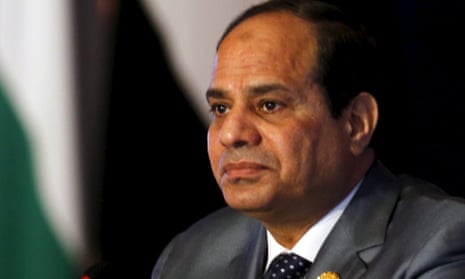Barack Obama has restored US military aid to Egypt that he suspended after the 2013 overthrow of Egypt’s first elected president, citing a need to combat Islamic State militants.
In what amounts to an epitaph for Obama’s stated aspirations for the Arab Spring, money and weapons will flow once more from Washington to Cairo as Obama signaled a restoration of traditional US support for Egyptian dictators.
The White House announced on Tuesday that Egypt’s Abdel Fatah el-Sisi will soon receive 12 F-16 fighter jets, replacement kits for 125 Abrams tanks, 20 Harpoon missiles and $1.3bn in annual military funding suspended after Sisi’s summer 2013 coup and crackdown.
The restored funding, National Security Council spokeswoman Bernadette Meehan said in a statement, would ensure that Egypt will remain the second-largest recipient of US foreign military financing, behind Israel.
Obama, however, is insisting that he is not giving the coup – which he has never labelled as such – a free pass. Meehan claimed in the statement that the US will speak “frankly and directly” about Egypt’s “political trajectory”.
Certain funding mechanisms will also change, including the end of a line of credit for Egypt’s military. But those changes will not be implemented until the 2018 fiscal year, Meehan’s statement said, when Obama is no longer in power, leaving ambiguous whether his successor will implement them.
“It’s intended to send a message of support and a message of concern at the same time,” Jon Alterman of the Center for Strategic and International Studies said.
Egypt, a traditional regional power and close military partner of the US for nearly 40 years, has vexed the Obama administration since Arab spring demonstrators toppled the brutal autocracy of Hosni Mubarak in 2011. Obama’s cautious and vacillating position on the demonstrators (which included Muslim Brotherhood Islamists as well as secular liberals) before ultimately backing Mubarak’s downfall drew much criticism and sowed confusion about US policy in the Middle East.
Yet when Obama spoke most fulsomely about the promise of the since-quashed Arab spring, he rested his support for it in part on the same grounds that on Tuesday he rested support for its opponents: the fight against terrorism.
On Sunday, Sisi proposed a pan-Arab military coalition to confront the advance of Isis, and perhaps the Iran-backed Houthi rebels in Yemen. This comes after a spate of attacks on Egyptian soil. In January, an attack on Egyptian forces in the Sinai peninsula, said to be at the hands of Isis-affiliated militants, killed at least 32 people. A failed state also lurks on Egypt’s western border, as the fallout from Obama’s 2011 war in Libya has yielded chaos and more Isis adherents.
Sisi, a career army officer before seizing power, has been loudly campaigning for a restoration of US military sponsorship. “We need the US to clearly understand that there is a strategic vacuum in this region,” he told the Washington Post earlier in March, while claiming “Sisi reflects the popular will of Egyptians”.
Alterman said the funding restoration was unlikely to remove the “intense Egyptian frustration” at Washington, but “it marks a return at least a more active relationship than we’ve had for 18 months”.
A powerful Republican and Obama critic who helms the House armed services committee, Mac Thornberry of Texas, praised the renewed US aid.
“We encourage the government of Egypt to continue its democratic process,” Thornberry said. “But Egypt is also a strong regional ally. Maintaining that relationship must be a priority for the US. Providing them with the means to protect Egyptians and Americans from the threat of terrorism is the right thing to do.”

Comments (…)
Sign in or create your Guardian account to join the discussion